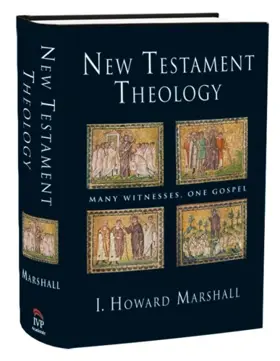

New Testament Theology: Many Witnesses, One Gospel
Pages
765
Publisher
InterVarsity Press
Published
2004
ISBN-13
9780830827954
A 2005 ECPA Gold Medallion winner! "New Testament theology is essentially missionary theology," writes I. Howard Marshall. Founded on a sure-footed mastery of the data and constructed with clear thinking lucidly expressed, this long-anticipated New Testament theology offers the insights born of a distinguished career of study, reflection, teaching and writing on the New Testament. Marshall's New Testament Theology will speak clearly to a broad audience of students and nonspecialists. But even on the most familiar ground, where informed readers might lower their expectations of learning something new, Marshall offers deft insights that sharpen understanding of the message of the New Testament. Here is a New Testament theology that does not succumb to the fashion of settling for an irreconcilable diversity of New Testament voices but argues that "a synthetic New Testament theology is a real possibility. Beginning with the Gospels and Acts, proceeding to each of Paul's letters, focusing then on the Johannine literature and finally looking at Hebrews and the remaining general epistles, Marshall repeatedly stops to assess the view. And gradually he builds up a composite synthesis of the unified theological voice of the New Testament. On the way toward this synthesis, Marshall highlights clearly the theological voices of the individual New Testament books. Thus, his New Testament theology serves also as a sort of introduction to the New Testament books, making it double as an attractive complement to book-by-book introductions to the New Testament. Here is a New Testament theology that will not only guide students and delight teachers but also reward expositors with a lavish fund of insights for preaching. Features & Benefits
* Offers the mature thought of one of our finest contemporary evangelical New Testament scholars
* Features the diversity and the unity of the New Testament
* Emphasizes the missionary context, motivation and message of the New Testament
* Presents seasoned and trustworthy insights written with clarity
* Chapters devoted to each NT book or group of books serve as theological introductions to each NT book
* Gives synthetic views of similar NT literature as well as whole of the NT
Reviews
[Full Review]
Downers Grove, Ill.: InterVarsity Press, 2004. Pp. 765. Hardcover. $40.00. ISBN 0830827951. Edward W. Klink III Talbot School of Theology, Biola University La Mirada, CA 90639 Although most who attempt to write a theology of the New Testament reside on the European continent, I. Howard Marshall is one of only a few British scholars (e.g., Caird) who have joined the fray. Called the �dean of Evangelical New Testament scholars,� Marshall is certainly not void of a theological starting point, as the subtitle suggests. Yet Marshall�s New Testament Theology is a fair and judicial treatment of the many witnesses of the text of the New Testament, as well as the methodological tact needed to engage the current scholarly discussion. Marshall defines the audience and aim of this book: �The aim of this book is to provide a guide to the theology of the New Testament that will be at a level and of a length suitable for use by students but will be also of use to all who are interested in the subject� (9). In light of Mars hall�s audience and aim, this review will try to summarize Marshall�s general proposal and provide a general appropriation of his conclusions for New Testament studies. Since his methodological approach controls the results of his examination, we will spend most of our time there. Marshall�s first chapter, �How Do We Do New Testament Theology?� is more than his introduction; it is a survey of approaches to New Testament theology and the justification of his chosen methodological approach. After critiquing opponents and their criticisms of doing a theology of the New Testament, specifically the criticisms of Heikki R�is�nen, Marshall catalogues some of the recent approaches.
[Full Review]

